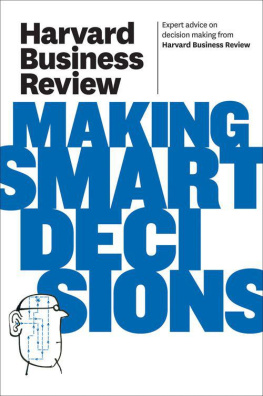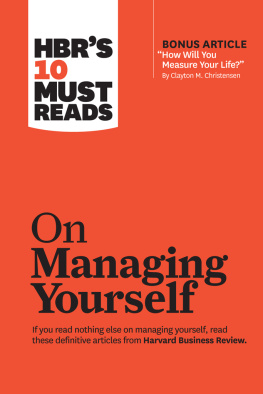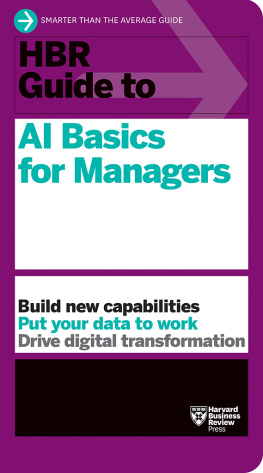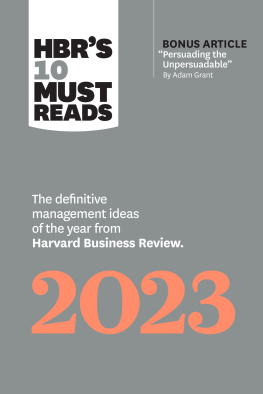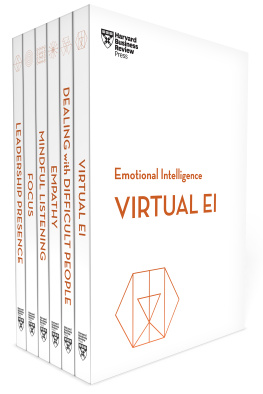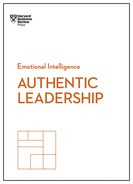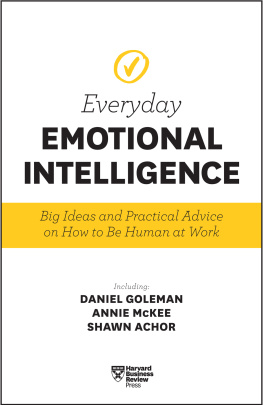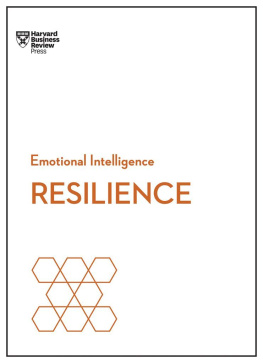Virtual EI
HBR EMOTIONAL INTELLIGENCE SERIES
HBR Emotional Intelligence Series
How to be human at work
The HBR Emotional Intelligence Series features smart, essential reading on the human side of professional life from the pages of Harvard Business Review.
Authentic Leadership
Confidence
Dealing with Difficult People
Empathy
Focus
Happiness
Influence and Persuasion
Leadership Presence
Mindful Listening
Mindfulness
Power and Impact
Purpose, Meaning, and Passion
Resilience
Self-Awareness
Virtual EI
Other books on emotional intelligence from Harvard Business Review:
HBR Everyday Emotional Intelligence
HBR Guide to Emotional Intelligence
HBRs 10 Must Reads on Emotional Intelligence
Virtual EI
HBR EMOTIONAL INTELLIGENCE SERIES
Harvard Business Review Press
Boston, Massachusetts
HBR Press Quantity Sales Discounts
Harvard Business Review Press titles are available at significant quantity discounts when purchased in bulk for client gifts, sales promotions, and premiums. Special editions, including books with corporate logos, customized covers, and letters from the company or CEO printed in the front matter, as well as excerpts of existing books, can also be created in large quantities for special needs.
For details and discount information for both print and ebook formats, contact .
Copyright 2022 Harvard Business School Publishing Corporation
All rights reserved
Printed in the United States of America
10 9 8 7 6 5 4 3 2 1
No part of this publication may be reproduced, stored in or introduced into a retrieval system, or transmitted, in any form, or by any means (electronic, mechanical, photocopying, recording, or otherwise), without the prior permission of the publisher. Requests for permission should be directed to , or mailed to Permissions, Harvard Business School Publishing, 60 Harvard Way, Boston, Massachusetts 02163.
The web addresses referenced in this book were live and correct at the time of the books publication but may be subject to change.
Library of Congress Cataloging-in-Publication Data
Title: Virtual EI.
Other titles: Virtual emotional intelligence | HBR emotional intelligence series.
Description: Boston, Massachusetts : Harvard Business Review Press, 2022. | Series: HBR emotional intelligence series | Includes index.
Identifiers: LCCN 2021058592 (print) | LCCN 2021058593 (ebook) | ISBN 9781647823290 (paperback) | ISBN 9781647823306 (epub)
Subjects: LCSH: Emotional intelligence. | Virtual work. | Telecommuting. | Work environment--Psychological aspects. | Virtual work teams.
Classification: LCC BF576 .V57 2022 (print) | LCC BF576 (ebook) |
DDC 152.4dc23/eng/20211217
LC record available at https://lccn.loc.gov/2021058592
LC ebook record available at https://lccn.loc.gov/2021058593
ISBN: 978-1-64782-329-0
eISBN: 978-1-64782-330-6
The paper used in this publication meets the requirements of the American National Standard for Permanence of Paper for Publications and Documents in Libraries and Archives Z39.48-1992.
Contents
Rebuildand maintainrelationships.
By Mark Mortensen and Heidi K. Gardner
When we cant share our whole selves, work suffers.
By Amy C. Edmondson and Mark Mortensen
Its okay to... document things like what your work styles are and how youll communicate.
By Liz Fosslien and Mollie West Duffy
Stay connected when youre always oneven if youre not always on together.
By Arjun Narayan, Rohan Narayana Murty, Rajath B. Das, and Scott Duke Kominers
Tune in and get engaged.
By Sarah Gershman
It takes more than filters and good lighting.
By Joel Schwartzberg
A bit of banter builds deeper connections.
By Bob Frisch and Cary Greene
Read the Zoom.
By Sarah Gershman
Dont let incivility hide behind a keyboard.
By Dana Kabat-Farr and Rmi Labelle-Deraspe
Dont just be onlinebe present.
By Alyson Meister and Amanda Sinclair
Virtual EI
HBR EMOTIONAL INTELLIGENCE SERIES
WFH Is Corroding Our Trust in Each Other
By Mark Mortensen and Heidi K. Gardner
P redictability is the foundation of trust. Were willing to be vulnerableto expose ourselves to potential riskwhen we have reason to believe that someone will not take advantage of us or disappoint us. This comes only when we think we can anticipate how others will behave. One of us, Heidi K. Gardner, researched more than 3,000 senior knowledge workers and identified two distinct kinds of trust that are essential for people to work together effectively. First, they need to believe that others will deliver and that the work will be high quality (competence trust). Second, they need to believe that others have good intentions and high integrity (interpersonal trust). To trust colleagues in both of these ways, people need clear and easily discernible signals about themwhat theyre doing (actions), why theyre doing it (motivations), and whether theyll continue to do it (reliability).
Over the past two decades, the moves toward remote working and dynamically shifting teams have made this information harder to come by. Less face-to-face time means that we have less opportunity to observe, for example, that a teammate consistently brings along prepared notes and diagrams to enhance the conversation. We also have fewer shared sidebar conversations that build rapport and interpersonal trust, and we lack situational cueslike the leftover pizza boxes as evidence colleagues pulled an all-nighterto understand others efforts and outputs. This makes it difficult to establish trust in others because we dont have the data we need to know what theyll do. It also eliminates the steady stream
In virtual work, misunderstandings and miscommunications abound. There are a few steps leaders should take to bring trust back to their and their employees relationships.
Understanding the Science of Trust
An increasingly common approach to dealing with decreased trust is to counter it with increased Whether done through technology (for example, keystroke capture) or process (for example, daily check-ins), monitoring is usually counter-productive.
Monitoring fails because it tries to solve the wrong part of the trust equationits about managers trying to eliminate the space for vulnerability. The better approach is to leave the space alone but reduce the likelihood that someone will take advantage of it (and you). This doesnt mean trusting blindly, but rather relying on the science of trust to build it in the least risky way possible.
Recognize and leverage reciprocal trust. So often, when we talk about trust, we focus on how we develop it in other people. This misses the fact that trust is bidirectional and reciprocalresearch shows that the more you trust someone and act accordingly, the more likely they are to trust you in return. Importantly, these do not operate independently. This means that in order to increase trust within your network, you need to shift your focus to signaling your own trustworthiness. Increasing others trust in you reduces uncertainty by creating a more stable and certain environment. Thinking in more Machiavellian terms, it also provides reciprocal leveragethe more trust they place in you, the less likely they will be to betray your trust (think mutually assured destruction as the underpinning of the entire Cold War). This is not setting yourself up to be taken advantage of; this is a strategic move that de-risks trust building. And remember that which signals you send is one of the few things you do have control over.


